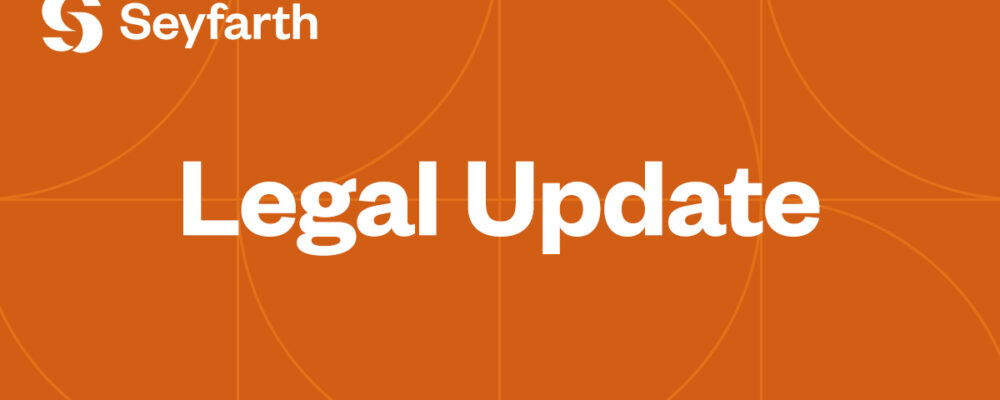The landscape of transgender employment laws is evolving globally, with various jurisdictions adopting laws that ensure inclusivity and non-discrimination in the workplace. This area is one of the most complex issues in employment law systems and has generated much controversy. Notwithstanding this, many global companies seek to support and promote the interests of women regardless of their gender identity or expression. This commitment aligns with the broader international trend of recognizing the rights of transgender individuals in the workplace. Transgender rights have been part of broader DEI initiatives for some time and are protected by law in some countries. There is an emerging body of law considering how these transgender legal protections interact with existing legal protections based on sex or gender.
In this article we consider, in the international context, a recent decision of the Federal Court of Australia that has been noticed around the world. We have focused on selective jurisdictions for the purposes of comparison, but this issue is much wider than the limited number of countries referred to in this article.
The Australian Case
In Australia, the recent decision of Tickle v Giggle for Girls Pty Ltd (No 2) [2024] FCA 960 looked at the removal of a transgender woman (Ms. Tickle) from a female-only networking and dating app known as Giggle because, on a visual inspection, someone responsible for administration of the app had determined that she was a man (and therefore ineligible to participate).
Ms. Tickle is a transgender woman whose female sex is recognized by an official updated Queensland birth certificate.
The respondents’ conduct was found to be unlawful gender identity discrimination in the provision of goods and services, on the basis that:
- the app was imposing a requirement that users appeared to be (cisgendered) women, based on an examination of their profile photo
- while this requirement applied equally to everyone, it had the effect of disadvantaging transgender women, and
- in the circumstances, the requirement was not reasonable.
The respondents argued that Ms. Tickle was believed to be a male, meaning there was no discrimination because of gender identity, and that Ms. Tickle was denied access to the app based on her sex at birth, which they considered to be male. They also argued that the Giggle app should be considered as a ‘special measure’ to achieve substantive equality between men and women.
The Court rejected these arguments:
- confirming prior cases that had found that a person’s sex is changeable and “sex can refer to a person being male, female, or another non-binary status”
- determining that the respondents had engaged in conduct in breach of the clear Parliamentary intent to prohibit discrimination on the ground of gender identity in the provision of goods and services
- commenting that “It simply cannot be that a special measure of advancing substantive equality between men and women provides any shield from gender identity discrimination.”
The respondents were ordered to pay $10,000 AUD plus Ms. Tickle’s legal costs. Their evidence in the case was that they had also made the decision to close down the Giggle app.
Australia
Under the Sex Discrimination Act 1984, gender identity has been a legally protected ground since 2013. However, the Australian Human Rights Commission has described this as the first case of its kind to go before the court.
This case highlights the need to be cautious in Australia before implementing any measures intended to advance the interests of a group based on sex or gender, if such measures exclude persons with different gender identities. Unless the measure (and discriminatory impact) can be shown to be reasonable or come within a ‘special measures’ exemption to remedy certain types of existing sex-based inequalities, then there is a real risk this would be unlawful.
United States
In the United States, the legal position on transgender protection is more nuanced. National (Federal) law bars discrimination based on sex under the Civil Rights Act of 1964. The United States Supreme Court has determined that this prohibition in extant law precludes drawing a distinction between cisgender and transgender individuals in the employment context. However, Courts continue to grapple with how this ruling applies to similarly worded prohibitions in education and public accommodation law, as well as to analyze its meaning under the United States Constitution. The Supreme Court’s reasoning in the employment context hinges on the rationale that treating a transgender female differently from a cisgender female is discriminatory sex stereotyping. However, in the employment context there remain many unanswered legal questions in the United States, including balancing the interests of religiously motivated private employers and employees with the interests of transgender and non-binary individuals. The Courts in the United States have not (at this stage) adopted the Australian position that measures to advance a group based on sex or gender cannot exclude persons with different gender identities.
United Kingdom
In the United Kingdom, the legal meaning of ‘sex’ is unclear due to a conflict between the definitions of ‘sex’ under two pieces of legislation: the Equality Act (“EA”) 2010 (the UK’s anti-discrimination legislation) and the Gender Recognition Act (“GRA”) 2004 (the UK’s gender change legislation). Under the GRA, if a person has a gender recognition certificate (“GRC”), the affirmed gender in that certificate is their gender for all purposes and is their ‘legal’ sex; whilst under the EA ‘sex’ (which is a characteristic that is protected from discrimination) is not clearly defined (i.e., it is ‘a reference to a man or a woman’).
This conflict has resulted in particularly prominent legal challenges in Scotland as to whether ‘sex’ for the purposes of the EA means biological sex or recognizes the legal sex of people with a GRC. This conflict will take the national stage in November 2024 when the UK’s Supreme Court hears For Women Scotland’s appeal of a judicial review decision on the legal definition of the word ‘woman’ (this litigation was first lodged in the context of the Scottish government’s definition of ‘woman’ in 2018 legislation on gender representation on public boards). The UK Supreme Court’s decision should provide clarity on the extent to which sex under the EA is defined as biological or legal.
Both pieces of legislation have also become the subject of increased political polarization. In April 2023, the UK’s Equality and Human Rights Commission recommended to the Minister for Women and Equalities that the government carefully consider redefining sex in the EA as biological sex; it said that this would bring greater legal clarity in eight areas (including single sex and separate sex spaces), but acknowledged that doing so would create ambiguity and potential disadvantage in three other areas.
In June 2024 (before its defeat in the General Election), the Conservative Party pledged to re-write the EA so that it defined ‘sex’ as biological sex, but a Labour frontbench MP said that guidance (rather than amending the EA) would be sufficient for clarifying the uncertainty here. In 2023, the UK’s Conservative government also rather controversially blocked the Scottish parliament from enacting legislation that would have made the Scottish process for obtaining a GRC easier. Conversely, the Labour Party’s 2024 election manifesto pledged to make it procedurally easier for transgender people to legally change their identity. We must wait to see how the Labour Party’s election to government in July 2024 impacts the ongoing discourse on this matter.
From an employment perspective, UK employment tribunals have found that holding gender critical beliefs (i.e., the belief that sex is immutable and biological) can be a protected philosophical belief capable of protection from discrimination under the EA. However, the manifestation of such beliefs in behavior might not be protected depending on what those behaviors are and how they impact on the legal rights of others not to be discriminated against on the basis of their sex or gender reassignment.
Hong Kong
Legal developments around gender identity in Hong Kong have largely been premised on constitutional rights enshrined in the Basic Law (for example, the right to marry and the right to privacy), rather than any express prohibition of gender identity discrimination. Gender identity is not a protected characteristic under Hong Kong’s anti-discrimination legislative framework, which has only four ordinances covering sex, disability, race, and family status.
The progression of gender identity rights in Hong Kong has been gradual and piecemeal, with limited case law to rely on. In 2013, a Court of Final Appeal case ruled that the interpretation of the Marriage Ordinance, which treats a transgender female (having undergone full sex reassignment surgery) as a “man,” was a violation of her constitutional right to marry by preventing her from marrying under her acquired gender. Following this, in 2017, the Hong Kong government set up an Inter-departmental Working Group on Gender Recognition to consider making legislative changes to reform transgender rights in Hong Kong. However, there has been little progress on this, which may be because gender identity remains a very divisive topic in Hong Kong. In February last year came a significant development in gender identity rights when the Court of Final Appeal ruled that the policy of barring transgender people from changing their gender markers shown on ID cards unless they underwent full sex reassignment surgery was unconstitutional because it violates the right to privacy. These judicial review decisions, while having no direct impact on the private sector, may have some indirect influence on how employers in Hong Kong, especially international employers, engage with, and treat transgender people.
Italy
In Italy, transgender persons have several legal protections and rights. Since 1982, transgender people in Italy have been allowed to change their legal gender. This process involves both medical and legal procedures.
Additionally, discrimination based on gender identity in employment has been prohibited in Italy since 2003. This means that employers cannot legally discriminate against transgender individuals in hiring, promotion, or any other aspect of employment.
Discrimination based on gender identity is prohibited in various contexts, including employment and public advertisement. The Italian Constitutional Court has ruled that non-binary individuals’ rights are also protected under the principles of social identity, equality, and the right to health as guaranteed by the Italian Constitution.
Whilst these legal protections are significant, Italy still faces challenges in achieving full equality for transgender individuals, particularly in areas like healthcare access and social acceptance. Many transgender individuals in Italy still face challenges in the workplace. Surveys have shown that a significant number of LGBTQ+ workers, including transgender individuals, feel that their careers have been negatively impacted by discrimination.
Conclusion
The traditional legal approach of balancing competing interests creates particular difficulties when dealing with issues like the dignity of people or fundamental philosophical beliefs. Courts in every country are going to have to decide what of these interests are the most important.
“With approximately 900 lawyers across 17 offices, Seyfarth Shaw LLP provides advisory, litigation, and transactional legal services to clients worldwide.”
Please visit the firm link to site






